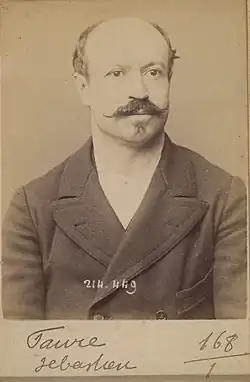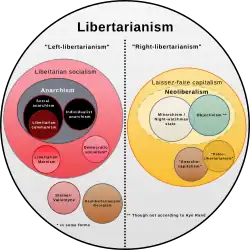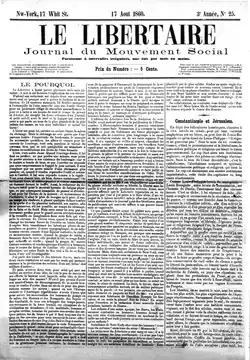Portal:Libertarianism
Introduction
Libertarianism (from French: libertaire, lit. 'free and egalitarian'; or from Latin: libertas, lit. 'freedom') is a political philosophy that holds freedom, personal sovereignty, and liberty as primary values. Many libertarians believe that the concept of freedom is in accord with the non-aggression principle, according to which each individual has the right to live as they choose, as long as they do not violate the rights of others by initiating force or fraud against them.
Libertarians advocate the expansion of individual autonomy and political self-determination, emphasizing the principles of equality before the law and the protection of civil rights, including the rights to freedom of association, freedom of speech, freedom of thought and freedom of choice. They generally support individual liberty and oppose authority, state power, warfare, militarism and nationalism, but some libertarians diverge on the scope and nature of their opposition to existing economic and political systems. (Full article...)
Selected article
Right-libertarianism (or right-wing libertarianism) refers to libertarian political philosophies that advocate negative rights, natural law and a major reversal of the modern welfare state. Right-libertarians strongly support private property rights and defend market distribution of natural resources and private property. This position is contrasted with that of some versions of left-libertarianism, which maintain that natural resources belong to everyone in an egalitarian manner, either unowned or owned collectively. Right-libertarianism includes anarcho-capitalism and laissez-faire, minarchist liberalism.
Selected quote
| “ | My idea of a perfect government is one guy who sits in a small room at a desk, and the only thing he's allowed to decide is who to nuke. The man is chosen based on some kind of IQ test, and maybe also a physical tournament, like a decathlon. And women are brought to him, maybe...when he desires them. | ” |
| — Ron Swanson (2009) Parks and Recreation (Season 1) |
Selected picture
.svg.png) |
General images
Selected biography -
.jpg)
Steven Wynn "Steve" Kubby (December 28, 1946 – November 20, 2022) was a Libertarian Party activist who played a key role in the drafting and passage of California Proposition 215. The proposition was a ballot initiative to legalize medical marijuana which was approved by voters in 1996. Kubby was known as a cancer patient who relied on medical cannabis.
Kubby authored two books on drug policy reform: The Politics of Consciousness (1995) and Why Marijuana Should Be Legal (2003). He was the Libertarian Party of California candidate for Governor of California in 1998, receiving 0.9% of the vote. In 2008, he declared his candidacy for the Libertarian Party's 2008 presidential nomination and received significant support for the nomination, but was eliminated after the second ballot. (Full article...)
Related portals
Parent portals
Socio-political portals
Topics
Categories

Points of interest
| Points of interest related to Libertarianism on Wikipedia: History – – Category – WikiProject – Alerts – Deletions – Assessment |
Associated Wikimedia
The following Wikimedia Foundation sister projects provide more on this subject:
-
Commons
Free media repository -
Wikibooks
Free textbooks and manuals -
Wikidata
Free knowledge base -
Wikinews
Free-content news -
Wikiquote
Collection of quotations -
Wikisource
Free-content library -
Wikiversity
Free learning tools -
Wiktionary
Dictionary and thesaurus
-
 List of all portals
List of all portals -

-

-

-

-

-

-

-

-

-
 Random portal
Random portal -
 WikiProject Portals
WikiProject Portals



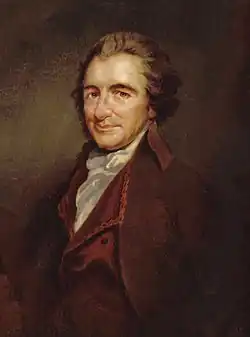

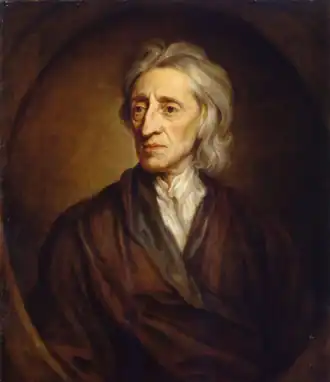

.jpg)



